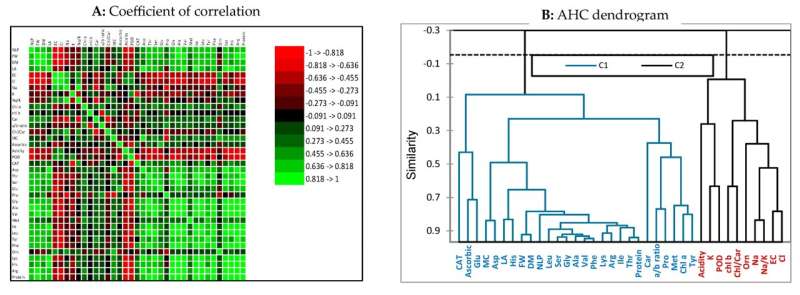This article has been reviewed according to Science X's editorial process and policies. Editors have highlighted the following attributes while ensuring the content's credibility:
fact-checked
proofread
Agronomists find green way to mitigate the effects of soil salinity

Most crops are sensitive to soil salinity. Excess salts cause salt stress—plants lack water, photosynthesis is suppressed, respiration worsens, chlorophyll breaks down, and potassium ions leak. Water-soluble toxic salts stimulate the synthesis of reactive oxygen species that destroys cells. Due to global climate change, there is more saline land.
RUDN University agronomists with colleagues from Egypt, Kazakhstan, and Russia have now shown that organic amino acids—biostimulants—can reduce the harm from salt stress. The paper is published in the journal Horticulturae.
"Salinization affects more than 6% of the world's land. Biostimulants are attracting research attention because they are a sustainable method for combating toxins and biotic stress to improve water and nutrient absorption. The use of biostimulants to mitigate salt stress instead of synthetic chemicals is the key to sustainable agriculture," said Meisam Zargar, Doctor of Agricultural Sciences, Associate Professor of the Department of Agrobiotechnology at RUDN University.
Agronomists created an environment that simulated salt stress and grew lettuce (Lactuca sativa). The authors then sprayed the lettuce with six amino acids: alanine, arginine, glutamine, glycine, methionine, and proline at a concentration of 0.5 grams per liter. After the end of the experiment, agronomists measured the activity of photosynthetic pigments, the level of ion absorption, the content of endogenous amino acids, and the activity of catalase and peroxidase enzymes—they regulate the oxidative processes of the plant and play a significant role in respiration.
Glycine, methionine, and proline improved the condition of plants. The use of amino acids mitigated the increase in electrical conductivity under the influence of salt stress. The amount of chlorine anions decreased by 25% compared to plants that were not treated with amino acids. The absorption of potassium cations improved, the concentration of chlorophyll also increased. Methionine and proline increased the production of pant's own amino acids.
"Amino acids had a beneficial effect on the growth, physiological, and biochemical characteristics of lettuce. To reduce the negative effects of salt stress, we recommend spraying lettuce crops with methionine or proline at a dose of 0.5 grams per liter. However, this is only a small part of the study of the potential damage from salinity due to climate change," said Zargar.
More information: Mostafa Abdelkader et al, Biostimulants-Based Amino Acids Augment Physio-Biochemical Responses and Promote Salinity Tolerance of Lettuce Plants (Lactuca sativa L.), Horticulturae (2023). DOI: 10.3390/horticulturae9070807
Provided by Scientific Project Lomonosov





















